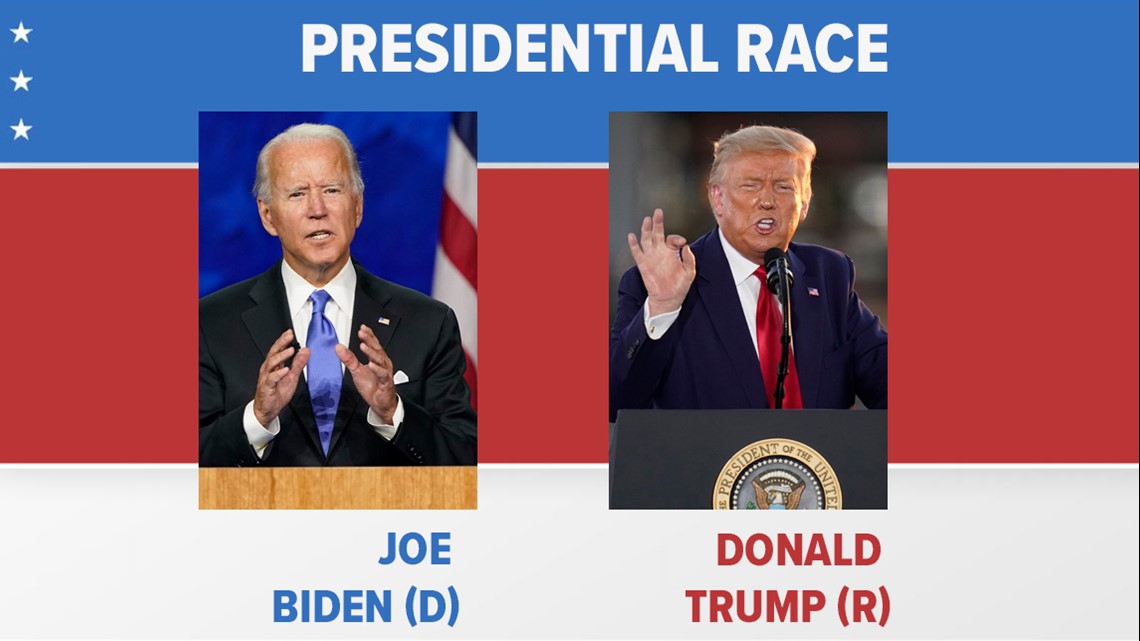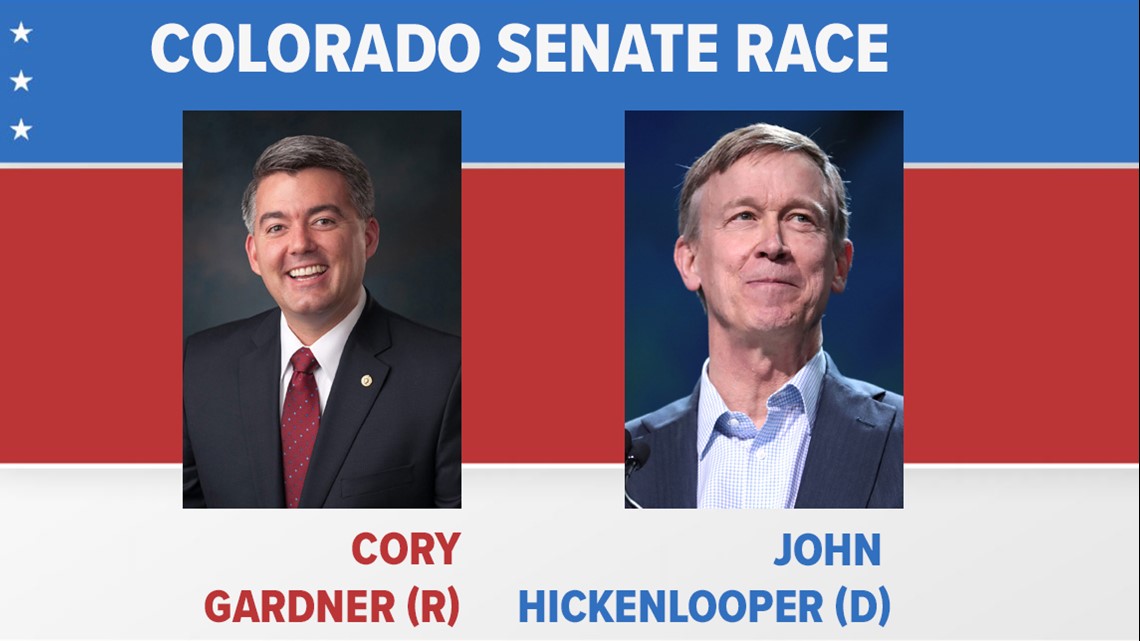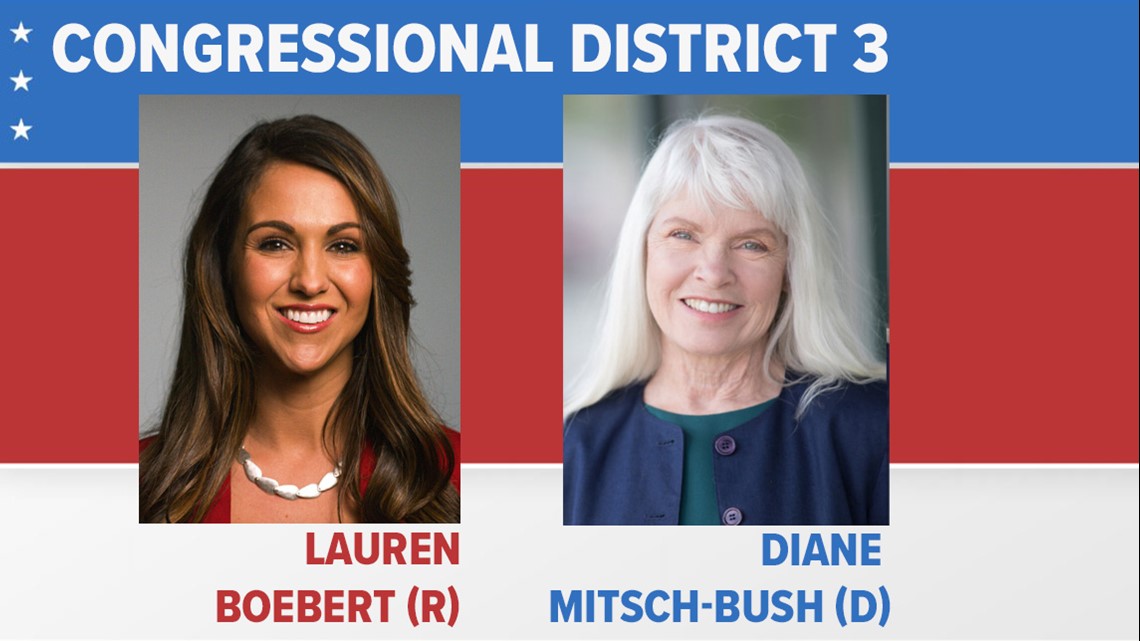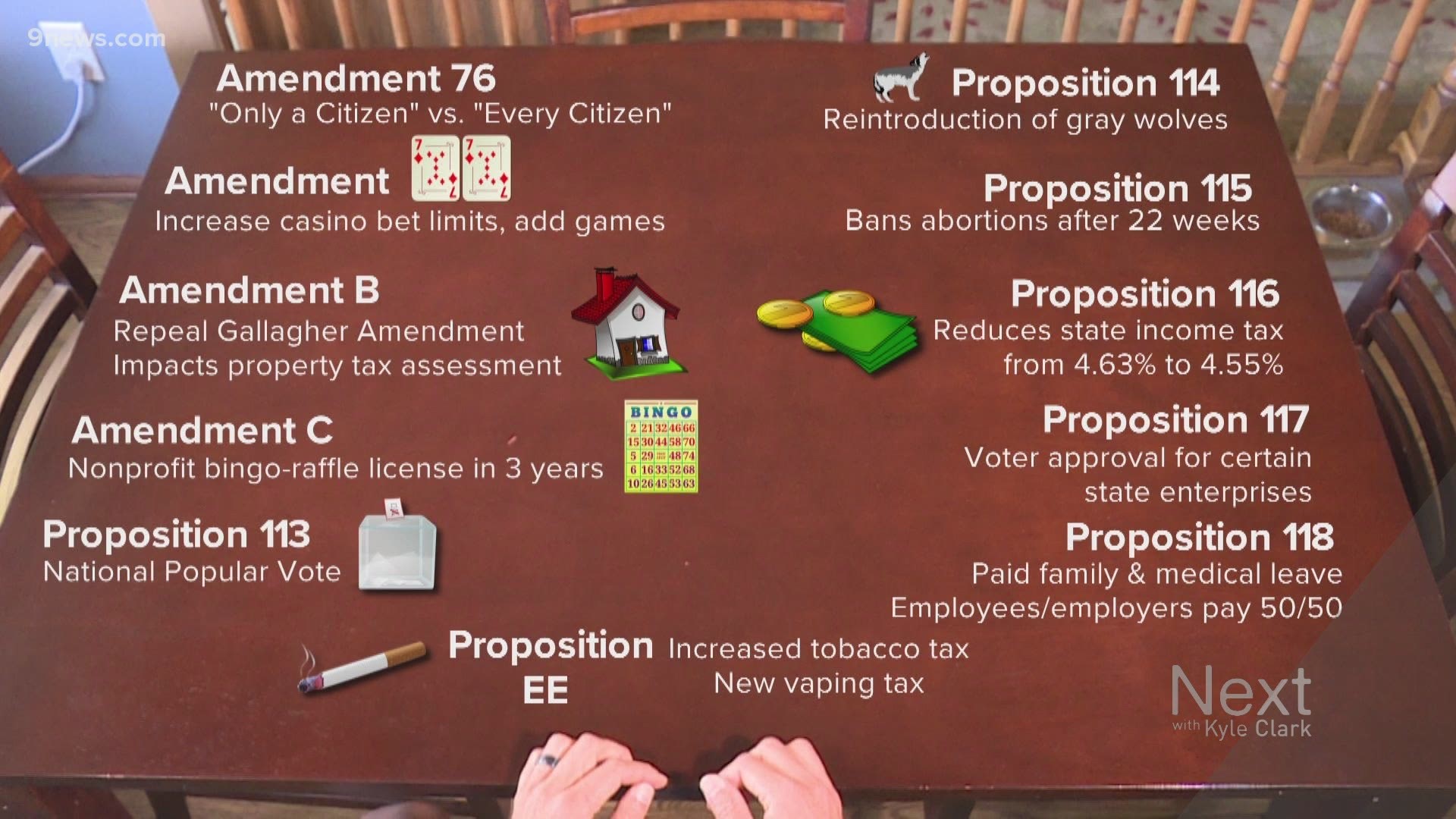Voter guide 2020: Everything you need to know about the election in Colorado
From voter registration questions to explaining how mail ballots work, here's the latest information about the upcoming election in Colorado.

The general election is on Nov. 3. From a look at the candidates to the ballot issues to making sure your vote is counted, here's a look at what to know.
We're presenting this voter guide in chronological order of the process. The topics include:
- Registering to vote.
- Receiving your ballot.
- Learning about candidates and issues.
- Turning in your ballot.
- Making sure your vote is counted.
- Tracking elections results.
How to register to vote You can register up to and on election day
First thing first: making sure you're able to vote in the first place.
Many people don't know that the process of getting a driver license automatically registers you to vote in Colorado. Check to see if you're already a Colorado voter by clicking or tapping here.
To register to vote online in Colorado for the first time, you'll need either a driver license or valid state-issued ID. To register online, click or tap here.
Printable voter registration forms are available by clicking or tapping here, or by visiting the county clerk and recorder's office, or any federal post office that provides voter registration applications.
You can then mail, fax or scan and email your complete and signed form to your county clerk and recorder's office.
Here are ways to register to vote in-person:
- A Colorado Department of Motor Vehicle office when you apply for a driver license, or when updating your driver license information.
- Offices that provide public assistance, including offices that provide state funded programs primarily engaged in providing services to persons with disabilities.
- Recruitment offices of the armed forces of the United States.
- Any federal, state or local government office, or any non-government office that chooses to provide voter registration service or applications.
- A voter service and polling center.
- A voter registration drive.
Here's a look at forms of ID accepted by the state of Colorado when registering to vote in-person.
To confirm that your registration is active and your ballot will be mailed to the correct address, click or tap here.
People without a fixed address or who are experiencing homelessness are still eligible to vote. The Colorado Secretary of State's Office recommends using an address that you plan to return to, such as a park or homeless shelter.
College students who are studying out of state or active military members can also continue to vote in Colorado.
Receiving your ballot and important dates Subtitle here
Colorado voters will receive mail-in ballots at the addresses listed on their voter registration, which is why it's important to check if your information is up to date.
They will also receive the 2020 Blue Book, a ballot information booklet is to provide voters with the text, title, and a fair and impartial analysis of each initiated or referred constitutional amendment, law, or question on the ballot.
However, you don't have to wait to get a ballot in the mail to vote. Under state law, the earliest you can vote in-person is Sept. 19, by walking into the county clerk's office and requesting a mail-in ballot. Since that date is a Saturday, it's more feasible the earliest voting can happen is Sept. 21, a Monday when government offices will be open.
This is also when county clerks can have ballot collection boxes in their offices. Check with your local county clerk to see if they will have ballots available by that date.
Under state law, the latest that these mail-in ballots will be available in-person is Oct. 2. This also coincides with the last day county clerks must have mail-in ballots printed and in their possession, but many will have them sooner.
Oct. 9 is the first day that ballots will be mailed to voters. To check the status of your ballot after that date, click or tap here.
The last day clerks can send out ballots is Oct. 15. Dropboxes and in-person voting centers open on Oct. 16. Ballots can be picked up and turned in at these locations.
It's worth noting that you can vote up until 7 p.m. on election day (Nov. 3). If you're in line at a polling center at 7 p.m., it will stay open until your vote is counted.
If you've lost your mail ballot, you can ask for a replacement from your county clerk.
Filling out your ballot Research the candidates and issues
Here's a look at some of the key races in Colorado — and an introduction to the candidates.
The big stories this year include the presidential race, and Colorado's hotly-contested U.S. Senate seat, which is a key target for Democrats in their effort to win the majority. Incumbent Republican Cory Gardner is in a tough race against Democrat and former Colorado Governor John Hickenlooper.
Other major races include Colorado's third congressional district, where right-wing Republican Lauren Boebert defeated incumbent Scott Tipton in the primary. She will now take on former Democratic Colorado State Rep. and Routt County Commissioner Diane Mitsch Bush in the general election.
Presidential race
Incumbent Republican Donald Trump lost Colorado to Democrat Hillary Clinton in 2016 by nearly 5 points — the third presidential election in a row that a Democrat has won the state's nine Electoral College votes.
Earlier this year, the U.S. Supreme Court sided with the state of Colorado after one of its electors went rogue in the 2016 election, casting his vote for John Kasich instead of Hillary Clinton in an effort to undermine Trump. He was removed as an elector, and a series of lawsuits eventually went to the highest court in the land, which ruled that electors who officially cast the state's Electoral College votes in December are bound by the state laws that dictate how those votes are allocated.
In Colorado's case, each of those votes goes toward the candidate who won the general election.
However, that could change. The National Popular Vote is on this year's ballot, and if it passes in Colorado and enough states to reach 270 Electoral College votes, it could bind the state's electors to whoever wins a majority of votes nationwide.
But in 2020, the Electoral College will still determine the winner, not the national popular vote, even if it passes in Colorado. (You might think we could literally change it overnight but that isn’t possible).
Click on the link below for a look at Colorado's unique electoral history.


U.S. Senate
Colorado's hotly-contested seat is considered one of the keys to Democrats taking a U.S. Senate majority in 2020.
Click or tap here for more information on Cory Gardner and here for more information on John Hickenlooper.


U.S. House of Representatives
Third Congressional District
Eyes across the country are on western Colorado's third congressional district, where Republican gun rights activist Lauren Boebert — who sometimes touts the QAnon conspiracy theory on Twitter — defeated incumbent Scott Tipton in the primary.
In the general election, she will face Democrat Diane Mitsch Bush, a former Colorado state representative and Routt County commissioner who lost to Tipton by 8 percentage points just two years ago.
Click or tap the link below for an analysis of the race from 9NEWS Anchor Kyle Clark.


Other local congressional races
Colorado has seven current congressional districts. Click or tap here to figure out which district you live in by plugging in your address.
Here's a look at the other six races:
Incumbent Diana Degette (D) was first elected to her seat in this squarely Democratic district in 1996. She represents Denver and parts of Jefferson and Arapahoe Counties.
This year she is being challenged by Republican Shane Bolling, a first-time politician whose website offers few details about his background or policies.
Incumbent Joe Neguse (D) was first elected to this typically Democratic district representing the northern Front Range as well as Summit, Clear Creek, Park and Eagle counties in 2018. Before Neguse was elected, this seat was occupied by current Gov. Jared Polis (D-Colorado).
Neguse is running against Republican Charles Winn, a former Navy flight surgeon, physician and radiologist.
Incumbent Republican Ken Buck, who is also head of the Colorado Republican Party, currently represents this large district, which includes most of Eastern Colorado, including Baca, Bent, Cheyenne, Crowley, Elbert, Kiowa, Kit Carson, Las Animas, Lincoln, Logan, Morgan, Otero, Phillips, Prowers, Sedgwick, Washington and Yuma counties. Small portions of Adams, Arapahoe, Boulder, Douglas and Weld counties are also within its borders.
Buck won the 2018 election with 60% of the vote. This year he is competing against Democratic candidate Isaac McCorkle, a father of three and retired Marine Corps captain.
Incumbent Republican Doug Lamborn currently represents Colorado's fifth congressional district, which is located in Central Colorado, and encompasses Chaffee, El Paso, Fremont and Teller counties, as well as parts of Park County.
Lamborn won 57% of the vote in 2018. This year, he is competing against Democrat Jillian Freeland, who describes herself as a woman's healthcare provider, sociologist, grassroots activist and mother to two daughters.
Incumbent Democrat Jason Crow was first elected to this district in 2018, when he defeated now-Aurora Mayor Mike Coffman by a 54-42% margin in what was once one of the state's most contentious house districts.
It encompasses parts of Arapahoe, Adams and Douglas counties.
Coffman won the district five times before he was unseated by Crow amid changing demographics.
This year, Crow's opponent is Republican Steve House, the former chair of the Colorado GOP. House attempted to run for governor in 2014, but failed to make the primary ballot.
Incumbent Democrat Ed Perlmutter currently represents Colorado's seventh congressional district, which includes portions of Adams and Jefferson counties.
Perlmutter first won his U.S House of Representatives seat in 2006, and won the 2018 election with 60% of the vote.
This year he faces Republican Casper Stockham, a Gulf War veteran.
Other local elections
17th Judicial District Attorney's Office
The winner of this election will succeed term-limited District Attorney Dave Young, who made headlines this year for opting not to file charges against the officers involved in the death of Elijah McClain. McClain has recently become one of the faces of a social justice movement aimed to address systemic racism and police brutality.
Voters in Adams and Broomfield counties will choose between Democrat Brian Mason and Republican Tim McCormack.
Mason is a chief trial deputy at the 17th Judicial District Attorney's Office, and McCormack currently works for the First Judicial District Attorney's Office in Jefferson County.
Three of the seven seats on the Colorado State Board of Education are currently up for reelection. This agency is responsible for managing the state's public K-12 system — meaning they will make big decisions about upcoming school years and the COVID-19 pandemic.
Each board member represents one of Colorado's seven congressional districts. This year, board members from districts one, three and seven are up for election.
For the first time in 40 years, Democrats may control the University of Colorado Board of Regents, the governing body that oversees the system's operations and approves its budget — something that will be significant amid COVID-19 shortfalls. The regents can also hire and fire the university's president, and approve tuition increases.
Right now, Republicans control five of the nine seats on the board. Three are up for election this year, and there is not a Republican challenger for one of the seats.
Statewide ballot issues
From the national popular vote to rules about bingo to the fate of wolves in Colorado, voters will decide numerous issues in the 2020 election.
Click or tap the link below for a detailed breakdown of initiatives and propositions on this year's ballot.
Here are the initiatives in the order they appear on the Colorado Secretary of State's website.
- Proposition 113: National Popular Vote
- Proposition EE: Cigarette, nicotine and tobacco products tax
- Amendment C: Bingo raffles allow paid help and repeal five-year minimum
- Amendment B: Gallagher Amendment repeal
- Amendment 76: Citizenship qualification of electors
- Proposition 114: Restoration of gray wolves
- Proposition 115: Prohibition on late-term abortions
- Amendment C: Local voter approval of gaming limits in Black Hawk, Central City and Cripple Creek
- Proposition 118: Paid family and medical leave insurance program
- Proposition 117: Voter approval requirement for the creation of certain fee-based enterprises
- Proposition 116: State income tax reduction
SUGGESTED VIDEOS: Breaking down Colorado's 2020 ballot
Click the link below for a look at municipal ballot issues.
RELATED: Pit bulls and pools: The local questions 70 municipalities in Colorado will consider this election
How to judge judges
The State Commission on Judicial Performance evaluates district and county judges standing for retention in the following categories: integrity, legal knowledge, communication skills, judicial temperament, administrative performance and service to the legal profession and public.
Colorado Office of Judicial Performance Evaluations allows you to search for judges standing for retention in your district. Click or tap this link and search by your county.
The Colorado Office of Judicial Performance Evaluations publishes a list of all judges’ performance evaluations.
This year, two judges were listed as not meeting performance standards. They are Adams County Judge Tomee Crespin and Sedgwick County Judge Craig Dolezal.
In her performance evaluation, Crespin was accused of being "demeaning and disrespectful" to parties in the courtroom, as well as not being fair in her rulings.
"These surveys raised serious questions about whether Judge Crespin effectively applies the law to the facts, finding that she did not always base her decisions on the evidence and arguments made before her," her evaluation says. "Also troubling was that Judge Crespin did not appear to be fair and impartial to both sides."
Crespin responded by saying: "Voters should know I MEET PERFORMANCE STANDARDS based on State of Colorado compiled case data. I’m a Hispanic woman who grew up poor, graduated from Ranum H.S. and am raising my family in this community. I’ve experienced racist, demeaning, unfair and disrespectful behavior in life, that’s not how I treat people. I’ve ethically and honestly served this community for 20 years. I completed a performance plan to improve and conform to a traditional view of a judge. I’m not a traditional judge. I’m a direct, no-nonsense judge dedicated to equal treatment of all, based on fair application of the law."
The other judge who did not meet performance standards was Craig Dolezal in Sedgwick County. He was appointed to his part-time position in 2017 and has no formal legal training or experience.
"The Commission conducted an interim evaluation in the spring of 2019, which identified significant deficiencies in the areas of application and knowledge of the law, communications, diligence and case management," Dolezal's evaluation reads.
He was also accused of issuing verbal rather than written rulings, and placed on a performance improvement plan.
Dolezal's response was: "A County Court’s Jurisdiction is limited to lesser crimes and misdemeanors. The knowledge and experience required of a county judge is less than that of a judge in a higher court, and the satisfactory performance standards for all trial judges measured by the expected legal background and experience in the court room.
"Over the last three years, as a lay judge, extensive legal knowledge and experience has been acquired to adequately perform in the position. I believe my overall performance is satisfactory. Justice continues to be served and the public trust and confidence has been maintained. I am committed and confident in my abilities."
Making sure your vote is counted You can track your ballot online
As of this writing, the guidance is to make sure to mail in your ballot at least eight days before election day to make sure it's counted.
If you missed the deadline to mail your ballot and ensure it reaches your county clerk by 7 p.m. on election day, you can still use a drop box or vote in-person at a polling center.
In addition, the ballot can be brought directly to the county clerk's office.
To check the status of your mail-in ballot, visit GoVoteColorado.gov. This will show whether your ballot has been received and counted.
If you mailed in your ballot and see it isn't been processed and choose to vote in person, the Colorado Secretary of State's Office said the ballot that is received and processed first will be counted, and the other will be voided.
This doesn't mean you can vote twice. If someone submits a ballot but decides to change their vote, that ballot will be rejected and the district attorney for that county will be alerted, the Colorado Secretary of State's Office said.
Interactive map Where to turn in your ballot
In addition to mailing your ballot in, you can choose to leave it in a dropbox, voting in person or handing it off.
Here's an interactive map of locations where you can do so by county.
Voting during a pandemic Colorado clerks have new rules to follow during the COVID-19 pandemic
The Colorado Secretary of State's Office issued new guidelines in May for how counties can conduct elections during a global pandemic.
Specifically, the rules call for election judges, observers and members of the media to wear masks in polling places. Given that Colorado now has a mask mandate, this applies to voters too.
In addition, the guidelines call for clerks to have at least one backup polling center in the event there is a potential novel coronavirus contamination at the original location.
The rules also ask that voting machines be cleaned after every use, and voters and elections officials maintain six feet of social distance at all times.
The vast majority of Colorado voters submit their ballots either by mail or through ballot boxes.
Explaining the voting process from the clerk's side How do we know this is a fair election?
This year, President Trump has warned that a vote-by-mail election could lead to widespread fraud. You may recall he claimed there was widespread fraud in 2016, though that was never verified by any elections officials in any states.
Despite these claims, there is no evidence this is actually occurring, according to U.S. officials.
WATCH: How Colorado election officials verify your ballot signatures
Colorado's election officials have repeatedly touted the state's process. More than 99% of the ballots from the 2020 primary election came through the mail.
Ensuring that ballots delivered via dropboxes are counted fairly involves a chain of custody involving representatives from both political parties.
Watch the video above for an explanation of a ballot's journey from dropbox to the clerk.
And watch the video above below for an explanation about who controls ballot drop boxes (it's not political parties).
After elections, the state is required to conduct what's known as a "risk limiting audit." These ensure that vote tabulation systems are accurate. The results are available publicly online.
After the election, anyone can request a recount at their own expense. Those must be requested by Dec. 1.
Statewide coverage Read elections stories from around the state from the Colorado News Collaborative
Need more information? Have questions specific to your county?
Check out this resource from the Colorado News Collaborative, which involves reporters from 60 organizations across Colorado.
You can find elections stories related to your community.
SUGGESTED VIDEOS: Politics


